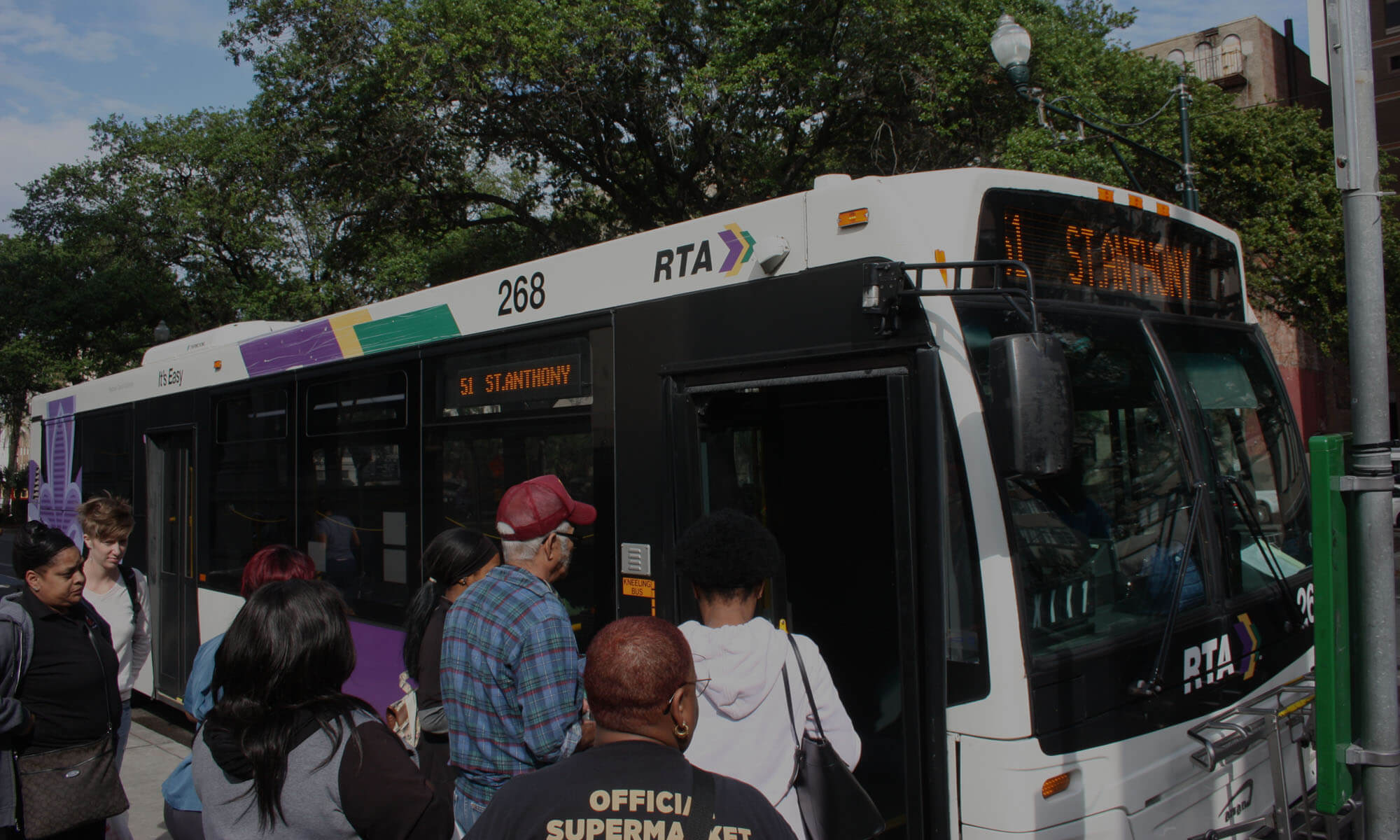Please consider signing the Ride New Orleans/HousingNOLA petition
The New Orleans City Planning Commission (CPC) is considering a policy that would mean more pavement, less affordable housing, and worse transit service for New Orleans.
We normally stay focused on transit-exclusive issues – we’ve got a small staff and there are only so many hours in the day. But we think this proposal to mandate unnecessary parking in the neighborhoods surrounding Tulane and Loyola is bad news for transit as well as a number of other issues.
If passed, it would make these neighborhoods less affordable and less transit friendly. It would mean more pavement and less trees and more dangers for people walking and less protection against flooding from heavy rainfall.
And it could set a precedent that could get followed in other neighborhoods, exacerbating our affordable housing crisis and making the RTA’s job to provide quality transit service even harder in the years to come.
What’s happening?
At issue is an effort to make permanent a temporary policy passed last year that mandates one additional off street parking space for every bedroom in new construction or renovations in neighborhoods surrounding Tulane University.
The bill was in response to complaints by some residents who said that a rise in single family homes being converted into denser unofficial ‘dorms’ marketed toward students has led to parking issues and noise concerns and lowered overall quality of life.
In response to these concerns, the City Council passed a temporary policy mandating the need for an off-street parking space for every additional bedroom in the affected area. That policy will expire later this year, hence the current effort, calling to expand the areas affected by the policy and to make it permanent.
If you’re curious, you can read the CPC’s staff report on the issue here.
What’s so bad about an extra parking space?
We all want neighbors to feel comfortable in their own neighborhood. And an additional off-street parking space might not seem like that big a deal when we have so many other pressing affordable housing and transportation issues to deal with. Why are we making such a big deal out of this?
The answer is that policies like this are never just about the effect on one property or one small area. They’re also about what they mean for the rest of the city. And in this case, the supposed cure for this localized quality of life issue is inherently unfair to the vast majority of New Orleanians. It will have cascading effects that make our city less equitable and less functional for all of us.
There are three big reasons for this:
- More pavement: Mandating more parking spaces doesn’t mean new housing construction will stop. It just means that the housing construction will have more pavement, with less trees and more curb cuts that make it more difficult and less safe for people to walk in their neighborhoods. And when we have more pavement and it rains – and it rains harder and longer due to the effect of cimate change – there is less place for the water to naturally go. So, we have the potential for even worse street flooding.
- Less affordable housing: Adding additional parking costs money – and that’s money that gets passed on to the buyerin market-rate housing or means affordable housing developers can’t develop as much affordable housing as they want to. Sometimes there isn’t any space for another off-street parking space – and that means no affordable housing can be built, period. That’s why Ride New Orleans allies the Greater New Orleans Housing Alliance (GNOHA) have been firmly against this bill from the beginning.
- It’s really bad for transit: For transit to work, people need to be able to walk to transit.And that means a certain amount of density is a requirement. It’s one of the reasons why it’s so hard to serve some parts of the West Bank or New Orleans East – because those areas were designed for people driving, not people walking or taking transit. The older East Bank neighborhoods have traditionally been more conducive for transit because they are denser. But over the last 50 years, it’s gotten harder to build anything that’s not a single-family home in many of those neighborhoods. And we’re not talking just about big apartment buildings – but also duplexes and smaller buildings with three or four units. That means it’s much harder for the RTA to serve many people and why we see the agency struggling to spread limited resources over wider areas, resulting in less reliability and more transit lines that only come once an hour at best.
An even bigger problem with this bill is the precedent it could set. Parking and noise are common quality of life complaints – it’s part of living in a city so it’s not like these concerns are unique to one neighborhood. Implementing this policy permanently could give momentum to small groups of neighbors in other neighborhoods who could then say, with some logic, that it’s not fair to only limit this option to wealthy Uptown neighborhoods. We could find ourselves piecemealing our way to a new, exclusionary zoning code that has the de facto effect of keeping out any new residents under a certain income level.
Plus, it won’t work!
On top of all these negative effects, the bill likely won’t solve the problem it seeks to address! After all, out-of-state students from wealthy families are more likely than many locals to be able to afford the more expensive housing in the first place.
Again, we’re sympathetic to concerns from neighbors in the area. We all deserve a little peace and quiet at home! But there are many more effective tactics – like working with the universities to build more on campus or official offsite housing and requiring more on campus living for undergraduates. Using zoning tools as a sledgehammer won’t work and it will have really unfortunate side affects for years to come.
What can I do?
If you agree that this bill will hurt transit service and could set a troubling precedent for the rest of the city, while doing little to address the problem neighbors are complaining about, please sign our petition to let the City Planning Commission (CPC) know.
If you want to take more time, you can submit a comment directly to the CPC.

